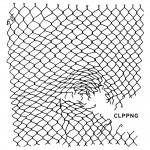
clipping. CLPPNG
(Sub Pop)
Innovation and vitality aren’t always the same thing. Let’s get the lazy Death Grips comparison over with by way of analogy: these bands sound little alike other than the noise-hop baton-tagging, but have a similar composition – two white guys from the weirdo underground on production, one unheard-of black guy with a distant underground rap history. The difference, disregarding their barely-comparable aesthetics, is the compulsive legitimacy and artistic integrity of Death Grips, their being-so and not-being-able-to-be-otherwise (as you've probably heard, they’ve released half an album and broken up in the last few weeks) – whereas Clipping seem to take what they do as a science more than an art. They lack that idiosyncratic urgency which would catalyse their equal measures of tradition and individual talent.
It starts off promisingly with an ear-splitting power electronics-style blare plus syncopated concept-salvo rapping (Intro), the record's most intense moment, lasting only a minute plus a few seconds of white-noise shredding. Lead track Body and Blood’s industrial clamour and sampled powertools are both impressively and stultifyingly loud enough to distract you from its forced-edgy sex & death narrative; elsewhere Story 2’s snowballing math-rap accumulation is one of the record’s cleverest conceits. But in the middle of the album there’s a maddeningly annoying one-two of tracks, the first consisting of pointless spaced-out lyrical dawdlings (Dream), which succumbs to silence and is interrupted by an entire track which basically uses an alarm clock instead of a beat (Get Up).
Even during this painstaking high-conceptuality the record constantly showcases production duo Jonathan Snipes & William Hutson’s hi-def sonic sculpturing, recalling the adventurousness of TNGHT or Rustie; they could potentially have made an incredible post-trap record under different circumstances. Both have their own strings of releases under their own guises likely only familiar to obsessive Wire subscribers and similar underground noiseniks; their experience pays off in terms of raw sonic skill, and the less esoteric platform afforded by Clipping gives them chance to really show off, albeit to frequent excess at the expense of consistency.
One thing CLPPNG begs for is a more cohesive lyrical approach from the group’s sole MC, Daveed Diggs. Although Diggs seemed mischievously happy behind the mask of the depraved, hedonistic antagonist of their 2013 debut Midcity, all semblance of character seems to have dissolved on this record. His lyrics feel as if they’re cribbed from notepads full of frustrated writers’ block scribblings, cobbled together to give the impression of stream-of-consciousness. Yet his delivery is strikingly confident, rhythmically inventive and sometimes lightning-fast – seldom does he actually say anything worth quoting.
His hooks are particularly irritating (and the better songs tend to eschew them), reaching a nadir with the ironically-autotuned Tonight: “If you ain’t locked it down by now / Then it’s time to figure out who fuckin’ tonight / Who fuckin’ tonight / Who fuckin’ tonight”, a tautologous parody of a style of music that basks in its own mindlessness (it’s unclear if Diggs is intentionally echoing UK one-hit-wonder Fatman Scoop). Throughout the song there’s an incongruous yet isolatedly brilliant piece of soundcraft that sounds like someone squeezing into PVC, which again demonstrates Snipes & Hutson’s Autechre-esque technical alchemy – and you can’t help but wonder what this record would be like if it didn’t have such an uncomfortable relationship with hip-hop as a genre, if the production actually meshed with the rapping. In fact, two of the strongest tracks are Work Work and Inside Out, both of which strike a smart balance between skittering ornamental electronics and catchy bass hooks when it matters.
Among many other figures of musical import, Clipping shout out Notorious B.I.G., Ludacris, and John Cage (the final track’s a “cover” of Cage’s tape collage piece Williams Mix). It’s also loaded with guest spots from underground rappers (most notably, Gangsta Boo of Three Six Mafia), seemingly to boost Clipping’s hip-hop cred rather than to improve the songs – it’s like they included anyone willing to show up, and they vary wildly in quality and tone. Similarly, the record’s musique concrète and other avant-garde sonic mechanisms are often haphazardly assembled into the album’s illogical machinery. The polarisation of their reference points indicates the bigger problem of their music, its inability to properly find common ground between the avant-garde and hip-hop – where so many others, from Antipop Consortium to Shabazz Palaces to cLOUDDEAD, have carved their own niches with aplomb.
Resultantly, the record lacks vision, direction, clarity. It spreads itself too thin; its intentionally stark contrasts in mood don’t so much construct a narrative as emphasise the band’s creative disunity. On a purely technical level this is a solid record, and for that reason Clipping ought not to be written off. But it’s so insincere; one could say the same of Midcity, but it was a much stronger record because of its consistency. Exactly what Clipping want to be, other than the sum of their parts, remains to be seen.
7 July, 2014 - 04:28 — Stephen Wragg